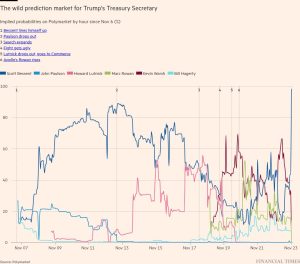Drug industry says it is not ready for ‘UK only’ labelling scheme
The UK generic drug industry is not ready to comply with new post-Brexit labelling rules for medicines entering Northern Ireland, the manufacturers’ trade body has warned, raising the risk of supply shortages.
The British Generic Manufacturers Association said the industry had insufficient time to meet incoming requirements for medicine packs to be labelled “UK only” from January 1 2025, and urged the UK government to delay implementation of the policy.
Guidance on the labelling scheme was introduced in July 2023, but BGMA chief executive Mark Samuels told the Financial Times only 60 per cent of the 100mn packs of generic medicines sent to Northern Ireland monthly were compliant, according to membership surveys.
Even if this rose to 90 per cent by the January 1 deadline, the equivalent of 10mn packs a month would still not meet the requirements, he added.
“We urge the new UK government and the European Commission not to enforce the prohibition on the supply of medicines that do not have the ‘UK only’ labelling in the UK from 1 January, as the consequences could be severe for patients,” said Samuels.
However, officials from both the EU and UK indicated they did not anticipate any delay to the introduction of the new rules, which are part of the Windsor framework deal on post-Brexit trading arrangements in the region, and designed to ensure all parts of the UK are treated equally.
“We feel we are in a position to move forwards towards that January 1 date as it stands,” said one UK government official with knowledge of the discussions. “We are not seeking an extension.”
The UK government said the Medicines and Healthcare products Regulatory Agency (MHRA) had received “UK only” artwork for about 70 per cent of medicines so far.
“The Windsor framework secures the long-term stability of medicines supply to Northern Ireland, ensuring that from January 2025 medicines will be available in the same packaging across the UK and resolving supply issues created by the Northern Ireland protocol,” the Department of Health and Social Care said in a statement.
It added that transitional measures were in place to avoid supply disruptions. These included allowing companies to place “UK only” stickers on packaging as a temporary measure and permitting stock produced before the end of 2024 to be sent to Northern Ireland.
However, the BGMA, whose members account for 85 per cent of the UK generics market by volume, said the new labelling scheme was not a practical solution.
“The cost to do this would in some cases double the cost of the actual medicine, as our industry is built on high volumes and razor-thin margins. We call on both sides of the negotiations to come to a sensible and practical resolution,” Samuels said.
The British Medical Association in Northern Ireland said it was not aware of the prospect of drug shortages. “If there is any risk of this, we would need to know as soon as possible and we would need a very quick resolution to protect our public,” said Alan Stout, chair of the BMA NI council.
A supply shortage risks triggering a political backlash in the region, which has been wracked by political disagreements since Brexit over how Northern Ireland can retain its place in the UK internal market.
Under the post-Brexit trading arrangements, Northern Ireland has retained a dual status, remaining part of the UK internal market while following many EU rules on commerce in goods to avoid the return to a trade border with the Republic of Ireland.
David Brooks, EU spokesman for the Democratic Unionist party, Northern Ireland’s biggest pro-UK political group, said: “This backs up why we are campaigning to fully restore Northern Ireland’s place within the United Kingdom, including removing the application of EU law in our country and the internal Irish Sea border it creates.”
Jim Allister, an MP and leader of the hardline Traditional Unionist Voice party, which has campaigned against the Windsor framework, said the labelling requirements were an example of “absurd and demeaning procedures” needed to allow Northern Ireland to retain dual access to both markets.
The European Commission declined to comment.
#Drug #industry #ready #labelling #scheme





